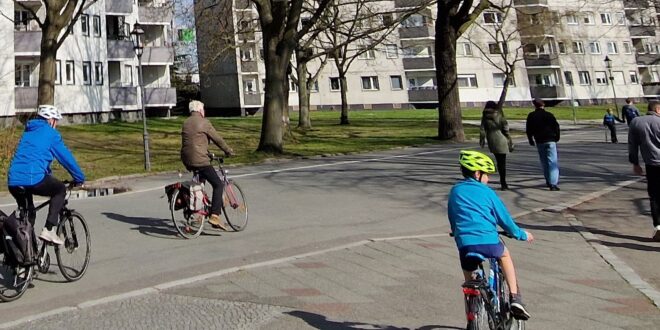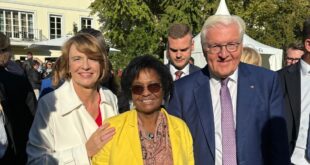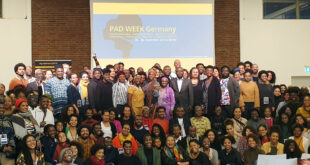Faced with an aging population and more people living alone, the German government plans to introduce a new legal mechanism to help people in non-romantic relationships to take responsibility for one another.
By Helen Whittle
The way that people in Germany live, love, parent and age is changing. But the question of who and how to take care of one another, be it childcare or caring for the elderly, still looms large in a society where one in four people say they are lonely.
Described by Justice Minister Marco Buschmann as “probably the biggest family law reform in decades,” the cornerstones of one potentially radical proposal have now been agreed by Germany’s coalition government of the center-left Social Democrats (SPD), Greens and neoliberal Free Democrats (FDP).
The so-called “Community of Responsibility” (Verantwortungsgemeinschaft) is to provide a new legal mechanism through which groups of between two and six people will be able to take legal responsibility for one another, for example in the case of a medical emergency.
“The community of responsibility also has an added symbolic value,” Buschmann said. “Anyone who enters into it gives a social bond a structure a positive name.”
‘Free space to experiment’
“The truth is there is no security in modern romantic relationships and people often learn that the hard way,” says Andrea Newerla, a sociologist who has conducted research on intimacy and relationship patterns.
In an aging society, Newerla says the question of how we want to live together and the types of support networks that people rely upon needs to be completely rethought. That includes the decentralization of the dominant relationship model of romantic love between two people.
“When we really want to do something as a group, a collective, I don’t know of any already existing concept in modern society that can be voluntarily legally entered into. We need to incentives for people to come together [beyond the romantic norm],” she told DW.
Newerla points to the example of “chosen families” created by queer people as a result of being rejected by their biological families after coming out, and that our daily lives would perhaps be better structured more around friendships as opposed to one romantic partner.
“We have to be creative and we also need incentives from the state to enable us to try out these different forms,” said Newerla. “The community of responsibility could actually be a free space to experiment, because it would actually be possible for groups of people to experiment with new forms of community in a way that is recognized by the state and legally protected [as marriage is].”
‘An offer no one is asking for’
The government says that the community of responsibility will help to make life easier for seniors and single parents. However, advocacy groups are skeptical about how much of difference it will really make to people’s lives.
“I don’t think it will change much for seniors,” Regina Görner, the chair of the National Association of Senior Citizens’ Organizations (BAGSO), told DW. “There are instruments already in place, such as the healthcare proxy, which is also less bureaucratic and time-consuming than if you have to use a notary.”
Elderly people are more than twice as likely to live alone as the average population. Around 32% of people aged 65 and over in the EU lived alone in 2022, in Germany that figure was 34%, according to the Scientific Institute of the Association Private Healthcare Insurers (WIP). It predicts that up to 5.75 million people will be in need of care in Germany by 2030, rising to 7.25 million by 2050.
Görner said she would instead prefer to see reform of the Caregiver Leave Act (Pflegezeitgesetz) which currently only enables immediate family members to take paid leave from work to care for a sick relative.
Heidi Thiemann, the founder of Alltagsheld:innen, a foundation advocating for the rights of single parents, shares similar concerns. “Single parents need very different things to be able to improve their situation. What we’re talking about here is an offer no one is asking for,” Thiemann told DW.
Today, around 33% of children are born to unmarried parents in Germany, up from 20% in 1998, according to the Institute of the German Economy, with the divorce rate at 39.9% in 2021.
Thiemann is concerned that people who are in romantic relationships but do not want to be legally married could use the new legal mechanism as an alternative to marriage, but with far fewer legal protections.
“Mothers, who still shoulder the majority of care work, will then be much worse off than if they had been in a marriage,” she explained. “The government has said there will no tax benefits attached to the reform but has not ruled out tax disadvantages.”
Community of responsibility not ‘marriage light’
Criticism of the reform has also come from the opposition center-right Christian Democrats (CDU/CSU) and the far-right populist Alternative for Germany (AfD). CDU legal policy spokesman Günter Krings suggested the new legal mechanism could open the back door to polygamy, which is currently recognized in Germany only for polygamous marriages legally concluded abroad.
“No one will be able to control the nature of the connection between people in such a ‘community of responsibility,'” he told the Redaktionsnetzwerk Deutschland media group.
Marriage and family enjoy protected status under the German constitution or “Basic Law”. The government has emphasized that the new reform is aimed at people in non-romantic relationships, above all elderly people, and says it is not “marriage light”: no tax concessions will be granted, nor will there be any consequences under inheritance law or maintenance obligations.
Just a pipe dream?
Newerla would like to see new progressive and experimental forms of communalization and togetherness supported by the state, but is concerned that the current political climate in Europe is heading in the opposite direction.
“I know that right-wing populists don’t want these new living concepts. It makes it hard for those who want to live in diversity, not only in romantic relationships, but all other forms of diversity,” said Newerla.
“The idea of the small family is very useful for both the state and for capitalism, because that’s where most of this unpaid care work, largely by women, that is really foundational to a functioning society and [market economy], takes place.”
The original paper for the community of responsibility from the FDP back in 2020 included suggestions for new ways to address financial questions like inheritance. Newerla says the current proposals are much less ambitious.
“I really ask myself why there’s such a big fear of new forms of togetherness,” she said. “I really hope that people realize that nothing is being taken away from them, but is actually being gifted to them.”
© DW
 THE AFRICAN COURIER. Reporting Africa and its Diaspora! The African Courier is an international magazine published in Germany to report on Africa and the Diaspora African experience. The first issue of the bimonthly magazine appeared on the newsstands on 15 February 1998. The African Courier is a communication forum for European-African political, economic and cultural exchanges, and a voice for Africa in Europe.
THE AFRICAN COURIER. Reporting Africa and its Diaspora! The African Courier is an international magazine published in Germany to report on Africa and the Diaspora African experience. The first issue of the bimonthly magazine appeared on the newsstands on 15 February 1998. The African Courier is a communication forum for European-African political, economic and cultural exchanges, and a voice for Africa in Europe.


































